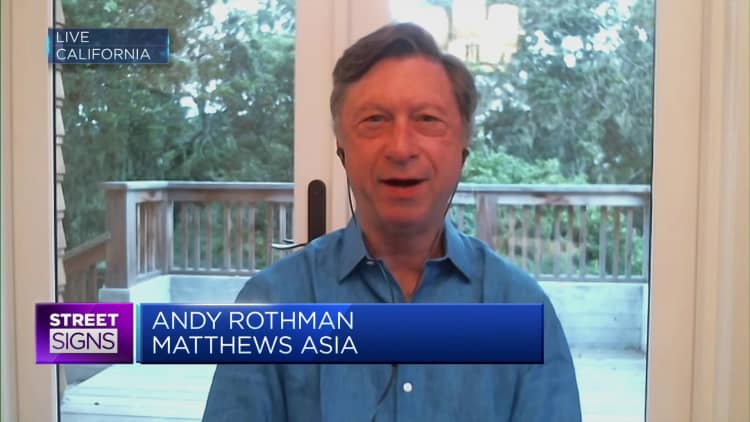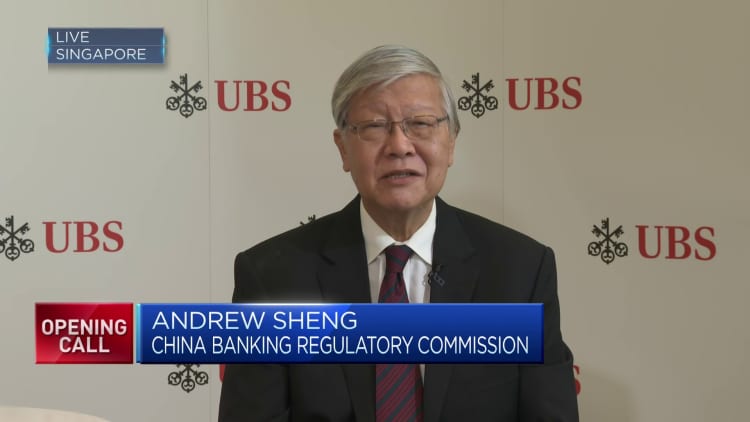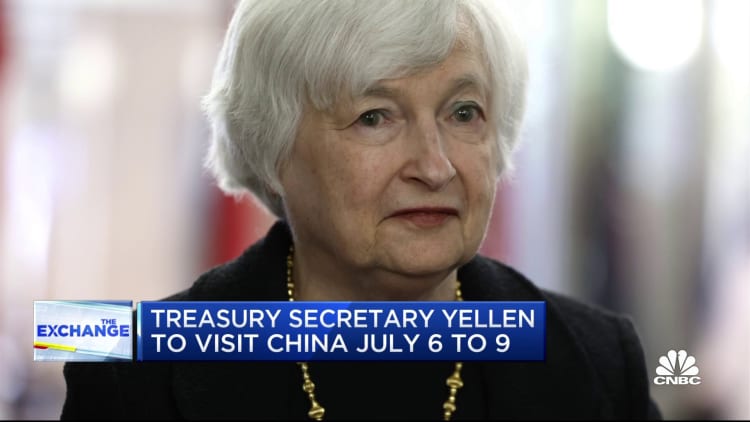U.S. Treasury Secretary Janet Yellen addresses journalists in a press conference July 9 capping her four-day Beijing visit.
Pedro Pardo | AFP | Getty Images
U.S. Treasury Secretary Janet Yellen said 10 hours of meetings with Chinese officials in two days were “direct, substantive and productive” and a step forward in helping to set relations between the world’s two largest economies on a “surer footing.”
Yellen’s Beijing trip comes at a time when Washington is considering curbs on U.S. investment in China amid an escalating global battle for technological supremacy. She is the second member of U.S. President Joe Biden’s cabinet to visit Beijing in recent weeks amid efforts to stabilize ties between the two powers.
“The U.S. and China have significant disagreements. Those disagreements need to be communicated clearly and directly,” Yellen said in prepared remarks. “But President [Joe] Biden and I do not see the relationship between the U.S. and China through the frame of great power conflict.”
“We believe that the world is big enough for both of our countries to thrive. Both nations have an obligation to responsibly manage this relationship: to find a way to live together and share in global prosperity,” she added.

In comments at a press conference capping her four-day Beijing visit, Yellen said she told her Chinese counterparts that any curbs on U.S. outbound investments would be “transparent” and “very narrowly targeted.”
Otherwise, she added, Chinese officials can raise their concerns and U.S. will in some cases, address unintended consequences.
“Broadly speaking, I believe that my bilateral meetings – which totaled about 10 hours over two days – served as a step forward in our effort to put the U.S.-China relationship on surer footing,” Yellen concluded.
Just days before Yellen’s visit, Beijing had slapped export curbs on chipmaking metals and its compounds — which China’s Ministry of Commerce claimed to have given the U.S. and Europe advance notice. In October, the U.S. launched sweeping rules aimed at cutting off exports of key chips and semiconductor tools to China.
Diversifying, not decoupling
Yellen said she “made clear that the United States is not seeking to decouple from China,” in her discussions with Chinese Premier Li Qiang, Vice Premier He Lifeng and other senior officials.
“There is an important distinction between decoupling, on the one hand, and on the other hand, diversifying critical supply chains or taking targeted national security actions,” she said.
“We know that a decoupling of the world’s two largest economies would be disastrous for both countries and destabilizing for the world,” she added. “And it would be virtually impossible to undertake.”

China Vice Premier He said Saturday talks with Yellen were “constructive,” according to a Chinese government readout.
“Noting that the overstretching of national security does no good to the normal economic and trade exchanges, the Chinese side expressed concerns over the sanctions and restrictions imposed by the United States on China,” the same statement said.
“The two sides agreed to strengthen communication and cooperation on addressing global challenges, and continue maintaining exchanges and interactions,” the statement added.
Tricky balance
Yellen’s task in Beijing was a tricky one. While she expressed her worries on “a recent uptick in coercive actions against American firms,” she also sought to seek Chinese cooperation on issues ranging from debt distress in emerging markets and developing countries to climate change.
These are principles she laid out in an April speech where she stressed the importance of fairness in the U.S. economic competition with China.

Then, she had outlined three economic priorities for the U.S.-China relationship: securing national security interests and protecting human rights, fostering mutually beneficial growth and cooperating on global challenges like climate change and debt distress.
“I believe that if China were to support existing multilateral climate institutions like the Green Climate Fund and the Climate Investment Funds alongside us and other donor governments, we could have a greater impact than we do today,” Yellen said ahead of a Friday climate finance roundtable in Beijing.
Yellen’s visit is part of ongoing efforts to stabilize U.S.-China relations after months of escalating tensions. Her visit came just weeks after Secretary of State Antony Blinken’s visit last month.
“My objective during this trip has been to establish and deepen relationships with the new economic leadership team in place in Beijing. Our discussions are part of a broader concerted effort to stabilize the relationship, reduce the risk of misunderstanding, and discuss areas of cooperation,” Yellen said Saturday.
These efforts could pave the way for a meeting between Biden and Chinese President Xi Jinping on the sidelines of the G20 leaders’ summit in New Delhi in September and the APEC leaders’ summit in San Francisco in November. Both leaders last met in Bali last year.
“No one visit will solve our challenges overnight,” Yellen said. “But I expect that this trip will help build a resilient and productive channel of communication with China’s new economic team.”

